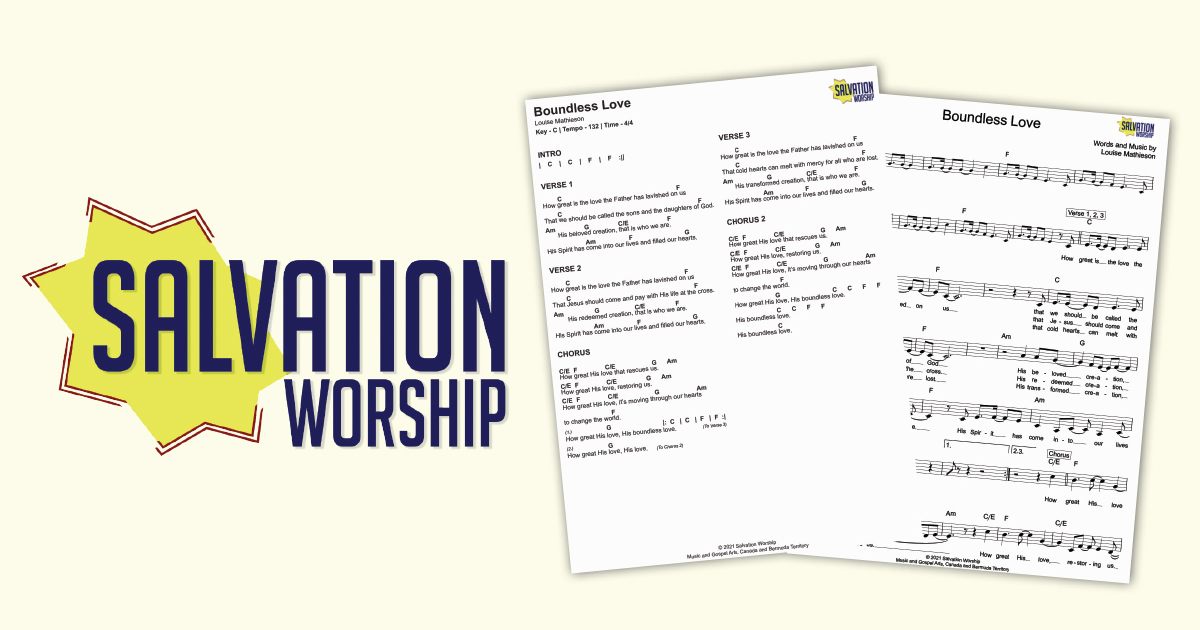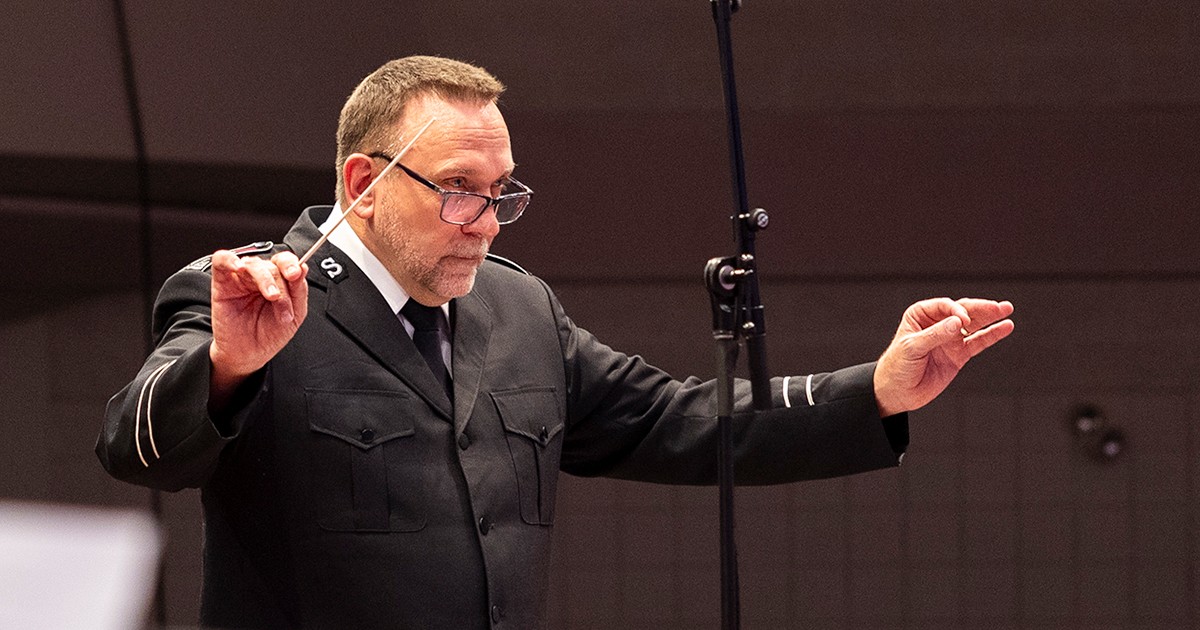David, the Bible’s premier songwriter, exhorts us to “Sing to the Lord a new song” in the opening verse of three different Psalms (96, 98 and 149). We have been taught that if something is repeated in Scripture, then we need to pay attention. So here it is again: sing to the Lord a new song!
The Salvation Army is fortunate to have a long history of singing new songs. We have had several editions of a denominational song book that are full of this rich heritage. It is how many of us learned our faith: we sang what we believe. There is something unique and special about singing our theology. Nick Aufenkamp, a pastor at Cities Church in Saint Paul, Minn., puts it this way: “Sure, we could speak the lyrics, and the truth in them should still move us to worship. But the elements of rhythm and melody arrest our affections in transformative ways not typical of speech alone.”
Modern technology has allowed new songs to spread widely at a pace not seen since Gutenberg invented the printing press. We can learn a new song at an online concert a hemisphere away and introduce it in our worship services the next week. The printed hymnal can’t keep up! This has given us a broad range of styles and genres to choose from but has occasionally also led to songs that don’t necessarily match our Salvationist doctrine working their way into our worship.
Sing to the Lord a new song! How do we do that, in a way that is new and fresh, while still honouring sound Salvationist doctrine, theology and religious practice? The music and gospel arts department (MAGA) has launched a new worship publication called Salvation Worship. The purpose of this new resource is to get new Salvation Army songs into our worship services. Songs that are contemporary, fresh and doctrinally sound, and, importantly, that are created for congregational use. Songs that you don’t have to be a professional vocalist to sing, but that are written in a normal vocal range, with learnable melodies, that can be sung by young and old alike.
The first edition of Salvation Worship has just been published and includes worship songs that have been written by Salvationists from Canada, Australia, Sweden and the United Kingdom. An international call for song submissions was sent throughout the Salvation Army world, and the submissions received were reviewed and selected by an international panel of contemporary music specialists. The chosen songs were then vetted to ensure they did match our theology and doctrine. The songs have also been translated into French, for use in those areas of the Canada and Bermuda Territory where French is the first language.
To make these new songs accessible for wide distribution, they are available for free from the MAGA website (salvationist.ca/maga), where you can download a lead sheet and chord chart. A lyric video, which can be used to help your congregation learn the song or be shown as part of your in-person or online service, will also be available, as well as devotional material for each song, Scripture references and rehearsal tips and techniques.
Lastly, you will be able to purchase a fully notated piano score, full brass band chord parts, or “punch” brass parts. One side benefit of these new songs is that they can be freely used and shared in corps videos and services without any worry of copyright infringement. Whether you only have one musician with a guitar, or want to blend a full worship team, brass band and congregation, you will be able to do it with these resources.
Sing to the Lord a new song. Salvation Worship has been designed just for that purpose: to help Salvation Army members, soldiers, officers and congregations declare their faith and affirm their beliefs as a united body. While it is a new song, it returns to the heart of the matter, as espoused by William Booth in 1877: “However, come it whence it may, let us have a real tune, that is, a melody with some distinct air in it, that one can take hold of, which people can learn, nay, which makes them learn it, which takes hold of them and goes on humming in the mind until they have mastered it. That is the sort of a tune to help you; it will preach to you, and bring you believers and converts.”
Craig Lewis is the territorial secretary for music and gospel arts.
This story is from:
The Salvation Army is fortunate to have a long history of singing new songs. We have had several editions of a denominational song book that are full of this rich heritage. It is how many of us learned our faith: we sang what we believe. There is something unique and special about singing our theology. Nick Aufenkamp, a pastor at Cities Church in Saint Paul, Minn., puts it this way: “Sure, we could speak the lyrics, and the truth in them should still move us to worship. But the elements of rhythm and melody arrest our affections in transformative ways not typical of speech alone.”
Modern technology has allowed new songs to spread widely at a pace not seen since Gutenberg invented the printing press. We can learn a new song at an online concert a hemisphere away and introduce it in our worship services the next week. The printed hymnal can’t keep up! This has given us a broad range of styles and genres to choose from but has occasionally also led to songs that don’t necessarily match our Salvationist doctrine working their way into our worship.
Sing to the Lord a new song! How do we do that, in a way that is new and fresh, while still honouring sound Salvationist doctrine, theology and religious practice? The music and gospel arts department (MAGA) has launched a new worship publication called Salvation Worship. The purpose of this new resource is to get new Salvation Army songs into our worship services. Songs that are contemporary, fresh and doctrinally sound, and, importantly, that are created for congregational use. Songs that you don’t have to be a professional vocalist to sing, but that are written in a normal vocal range, with learnable melodies, that can be sung by young and old alike.
The first edition of Salvation Worship has just been published and includes worship songs that have been written by Salvationists from Canada, Australia, Sweden and the United Kingdom. An international call for song submissions was sent throughout the Salvation Army world, and the submissions received were reviewed and selected by an international panel of contemporary music specialists. The chosen songs were then vetted to ensure they did match our theology and doctrine. The songs have also been translated into French, for use in those areas of the Canada and Bermuda Territory where French is the first language.
To make these new songs accessible for wide distribution, they are available for free from the MAGA website (salvationist.ca/maga), where you can download a lead sheet and chord chart. A lyric video, which can be used to help your congregation learn the song or be shown as part of your in-person or online service, will also be available, as well as devotional material for each song, Scripture references and rehearsal tips and techniques.
Lastly, you will be able to purchase a fully notated piano score, full brass band chord parts, or “punch” brass parts. One side benefit of these new songs is that they can be freely used and shared in corps videos and services without any worry of copyright infringement. Whether you only have one musician with a guitar, or want to blend a full worship team, brass band and congregation, you will be able to do it with these resources.
Sing to the Lord a new song. Salvation Worship has been designed just for that purpose: to help Salvation Army members, soldiers, officers and congregations declare their faith and affirm their beliefs as a united body. While it is a new song, it returns to the heart of the matter, as espoused by William Booth in 1877: “However, come it whence it may, let us have a real tune, that is, a melody with some distinct air in it, that one can take hold of, which people can learn, nay, which makes them learn it, which takes hold of them and goes on humming in the mind until they have mastered it. That is the sort of a tune to help you; it will preach to you, and bring you believers and converts.”
Craig Lewis is the territorial secretary for music and gospel arts.
This story is from:










Leave a Comment